|
|
|
Sort Order |
|
|
|
Items / Page
|
|
|
|
|
|
|
| Srl | Item |
| 1 |
ID:
146697
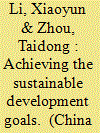

|
|
|
|
|
| Summary/Abstract |
Development became a G20 priority under the Korean presidency in 2010 and has remained central to global summitry ever since. Although the G20 has formally involved itself in the post-2015 process following the St. Petersburg Summit in 2013 and emphasized the Sustainable Development Goals (SDGs) as a core priority under Turkey's presidency in 2015, the UN remains the main channel for global negotiations and discussions of the post-2015 development agenda up to its approval and adoption in September 2015 and will continue to play the leading role in the follow-up implementation and tracking of SDGs. The present paper argues that as the SDGs come to dominate the agenda and action of donors and issues of financing take central stage, the G20 can play an important role in facilitating the implementation of the SDGs due to its various strengths, although it also faces serious challenges. The paper also points out that as the 2016 G20 chair, China can make great contributions in advancing the implementation of the SDGs both domestically and internationally.
|
|
|
|
|
|
|
|
|
|
|
|
|
|
|
|
| 2 |
ID:
100803
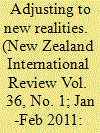

|
|
|
| 3 |
ID:
126247
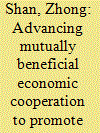

|
|
|
| 4 |
ID:
151384
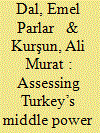

|
|
|
|
|
| Summary/Abstract |
This study attempts to identify possible new roles for intermediary actors in the changing global architecture by focusing on Turkey’s middle power capacity in the nascent middle power network of Mexico, Indonesia, South Korea, Turkey, Australia (MIKTA). It looks at an overarching embedded analytical triad of goals, means, and impact, superimposed over positional, behavioural, and ideational sublayers. It tests the assumption that the more a state holds together its middle power goals, means, and impact in a combined way, the more leverage it can have as a middle power in the changing international political economy. After reviewing the existing literature on middle powers, the first part of this paper outlines this embedded analytical framework. The second and the third parts seek to operationalize this framework, in particular at institutional and state levels in the example of MIKTA and Turkey. The fourth part delves into the opportunities and challenges that Turkey faces in its MIKTA trajectory (in the light of the conclusions drawn from the second and third parts). The study concludes that while Turkey possesses fairly compatible goals and impact with those of MIKTA, it is still far from channelling all of its capabilities to this new network due mainly to the domestic and regional impediments it faces—as well as the lack of a comprehensive roadmap in relation to MIKTA.
|
|
|
|
|
|
|
|
|
|
|
|
|
|
|
|
| 5 |
ID:
165202
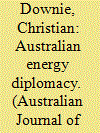

|
|
|
|
|
| Summary/Abstract |
While Australia is considered an energy superpower, Australian foreign policy has often overlooked energy diplomacy. Given the transformations taking place in global energy markets, the time is ripe to begin a policy discussion in Australia on energy diplomacy. I argue that Australian diplomatic efforts should broaden beyond a historical focus on promoting fossil fuels and securing export markets, to driving global energy governance reforms through the G20. This will not only help to ensure that the international energy architecture is capable of achieving governance objectives around energy security, energy access and climate change, but significantly, it will also help Australia to achieve broader foreign policy goals, such as ensuring emerging economies become responsible stakeholders within the international system.
|
|
|
|
|
|
|
|
|
|
|
|
|
|
|
|
| 6 |
ID:
146700
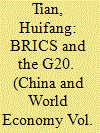

|
|
|
|
|
| Summary/Abstract |
Brazil, Russia, India, China and South Africa (BRICS) have come together economically as a group since 2009. Their cooperation has been driven not only by economic and political factors, but also the failure of the existing global economic governance framework to satisfy the real needs of these countries. In this paper, we analyze how the BRICS moved from a financial category into a political group, and are progressively developing from a dialogue-based platform into a full-fledged mechanism of long-term coordination on a wide range of key issues relating to the world economy and politics. We also analyze how the BRICS have coordinated their positions in the G20, pushing for deep reform in global governance. Then, given the major hindrances to cooperation among the BRICS, including the challenge of economic transition, weak geopolitical links, complicated internal and external relations and inadequate governance capabilities, the present paper speculates on how the BRICS can use the opportunity arising from China taking the G20 presidency in 2016 to improve the cohesiveness and influence of the BRICS in terms of their agenda, organization and deliverables.
|
|
|
|
|
|
|
|
|
|
|
|
|
|
|
|
| 7 |
ID:
110087
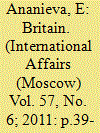

|
|
|
|
|
| Publication |
2011.
|
| Summary/Abstract |
BROKEN GLASS has been already removed but the August riots in Britain left a "broken society" behind them: an emergency session of the Commons; a prime minister promising to track down and to punish wrongdoers; the leader of the opposition pledging to stand shoulder to shoulder with him. It was as if the country was at war.1
Politicians and analysts tried to go to the roots, to identify the causes and suggest remedies: there was no shortage of explanations ranging from "rap music which glorifies violence and loathing of authority" to "no father at home" to get from him "a positive sense of masculinity," and the mortgage crisis.
|
|
|
|
|
|
|
|
|
|
|
|
|
|
|
|
| 8 |
ID:
163127
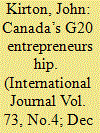

|
|
|
|
|
| Summary/Abstract |
Canada has been the successful entrepreneurial conceiver, co-creator, and normative and policy shaper of the G20 since the start. Under Paul Martin, Canada invented the concept and mission of the G20, co-creating it as a finance ministerial forum in 1999. Under Stephen Harper, Canada supported its elevation to summit in 2008, hosted it in 2010, and led important policy outcomes. Under Justin Trudeau, Canada further fostered the G20’s institutions, principles, and programs. Despite several entrepreneurial failures, Canada's lead was followed by established and rising members to make its G20 entrepreneurship succeed. Canada’s entrepreneurship was driven by its relative invulnerability to global shocks, its second-tier institutional position in the Bretton Woods institutions, and its rising relative capabilities. Canada’s three leaders brought strong domestic political control; continuity; expertise in business, economics, and finance; and mass public support. Canada was also a well-connected member of a G20 club at the hub of a global network.
|
|
|
|
|
|
|
|
|
|
|
|
|
|
|
|
| 9 |
ID:
140961
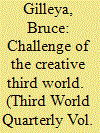

|
|
|
|
|
| Summary/Abstract |
This article is a contribution to recent literature on the shape of the polycentric world order. It argues that the Third World remains a valid concept for describing the interests and ideas that shape the foreign policies of many key non-Western states. However, the Third World has changed in a fundamental way. The article describes the historical emergence and contemporary manifestations of a ‘creative’ Third World in contrast to the ‘protest’ Third World of the past. It describes the nature of this shift and how it is reshaping Western leadership. It argues that the main challenge for the West is to create a coherent pluralism in international order that embraces this creative Third World.
|
|
|
|
|
|
|
|
|
|
|
|
|
|
|
|
| 10 |
ID:
146698
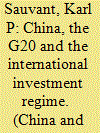

|
|
|
|
|
| Summary/Abstract |
China has become a major home country for outward foreign direct investment (OFDI) flows. As a result, the country is increasingly concerned with protecting its OFDI and facilitating the operations of its firms investing abroad and creating a strong universal international investment law and policy regime. This article briefly reviews the emergence of China as an outward investor. It continues with an analysis of some policy issues related to the rise of FDI from emerging markets. A brief discussion of issues central to the future of the international investment law and policy regime follows, before focusing on several outcomes that could be pursued under China's G20 leadership: nonbinding shared principles that could outline the architecture of a universal framework on international investment; an international support program for sustainable investment facilitation; and the creation of an additional intergovernmental platform that would allow for a continued systematic intergovernmental process to discuss the range of issues related to the governance of international investment, preferably paralleled by an informal, inclusive and result-oriented consensus-building process that takes place outside intergovernmental settings.
|
|
|
|
|
|
|
|
|
|
|
|
|
|
|
|
| 11 |
ID:
111030
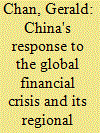

|
|
|
|
|
| Publication |
2012.
|
| Summary/Abstract |
This paper examines the role of China in the G20 and in East Asia in crafting appropriate responses and policies to the global financial crisis. Did China play an important part in the multilateralisation of the Chiang Mai Initiative, and how did China work with other players in East Asia to 'inoculate' East Asia against contagion and fallout from the crisis? The paper evaluates the type of leadership displayed by China and the decisions taken during the crisis. It assesses how the Chinese role in its own region and within global institutions such as the G20 would change in the aftermath of these crises.
|
|
|
|
|
|
|
|
|
|
|
|
|
|
|
|
| 12 |
ID:
101360
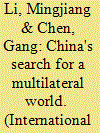

|
|
|
|
|
| Publication |
2010.
|
| Summary/Abstract |
While China will probably become more proactive in its multilateral diplomacy and increase its influence in global multilateral settings, various concerns and constraints make it unlikely that it will completely overhaul or even dramatically reshape the multilateral architecture at the global level. Stuck in defining its identity, China is caught up between posturing as a leader of the developing world on some policy issues and siding with the developed countries on others. China's involvement in global multilateralism is likely to be guided by pragmatism rather than grand visions.
|
|
|
|
|
|
|
|
|
|
|
|
|
|
|
|
| 13 |
ID:
127430


|
|
|
|
|
| Publication |
2013.
|
| Summary/Abstract |
None of the integration projects in history has ever encountered so strong resistance from both East and West. Its intensity denies the publicly declared thesis that the project is artificial, immaterial and even doomed.
|
|
|
|
|
|
|
|
|
|
|
|
|
|
|
|
| 14 |
ID:
151386
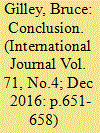

|
|
|
|
|
| Summary/Abstract |
The challenges for middle powers relate directly to their unstable positional status in the international system. Yet this unique position in the international Goldilocks Zone of having not too much power but power enough also gives them unique opportunities. Successful middle powers recognize their middle power status and then formulate a strategic diplomacy suited to this status in which they accept the centrality of great power interests and roles. Too many middle powers fail to do this because they entertain delusions of grandeur, and when those delusions are revealed they fall into isolation or disengagement from global governance.
|
|
|
|
|
|
|
|
|
|
|
|
|
|
|
|
| 15 |
ID:
146692


|
|
|
| 16 |
ID:
095382
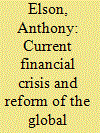

|
|
|
|
|
| Publication |
2010.
|
| Summary/Abstract |
The current financial crisis has sparked an active debate about the adequacy of the global financial architecture (GFA) or the collective governance arrangements for promoting the stability of the international financial system which are mainly centred in the operations of the Financial Stability Forum (now Board) and IMF. There are three areas in particular in which the governance arrangements for the GFA did not work effectively in the lead-up to the current crisis: the oversight of global financial system stability, the coordination of international financial regulation, and the provision of a lender of last resort mechanism. In the light of recent G20 decisions, proposals for reform in each of these areas need to be discussed.
|
|
|
|
|
|
|
|
|
|
|
|
|
|
|
|
| 17 |
ID:
103681
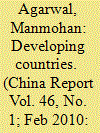

|
|
|
|
|
| Publication |
2010.
|
| Summary/Abstract |
This paper examines five issues: 1) Recent performance of developing countries in terms of growth, investment and integration with the world economy; 2) The impact of the crisis on these economies; 3) The response of policy makers in these economies to mitigate the adverse impact, in particular, the nature of the stimulus packages implemented in these economies; 4) The role developing countries can play in the recovery of the world economy; and 5) The role of China in the recovery, and, in particular, how to deal with the bilateral imbalance between the US and China. Special attention is paid to the behaviour of the economies of the developing country members of the G20 (DG20).1 Finally, the paper discusses what the crisis has revealed about the interests of Russia, India and China in the world economy and consequently a possible strategy for the G20 which would serve their interests.
|
|
|
|
|
|
|
|
|
|
|
|
|
|
|
|
| 18 |
ID:
147638
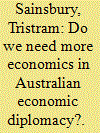

|
|
|
|
|
| Summary/Abstract |
Economic diplomacy—that is, informal and formal processes and links between states and non-state actors on international economic issues—is a current focus of Australian foreign policy. The Department of Foreign Affairs and Trade’s stated economy diplomacy aims are liberalising trade, boosting economic growth, encouraging investment and assisting business. If Australia is to embrace a genuine and effective notion of economic diplomacy there are two problems to be overcome. First, DFAT’s economic diplomacy framework is incomplete and misses the bigger economic picture, particularly the role of Australia’s key economic agencies, Treasury and the Reserve Bank of Australia. Second, DFAT does not consistently apply economic principles to foreign affairs issues including trade, foreign aid and the global investment agenda. Going forward, Australia should abandon the focus on the four narrow pillars and instead focus on developing a clear, coordinated international economic strategy that articulates Australia’s core international economic objectives and priorities.
|
|
|
|
|
|
|
|
|
|
|
|
|
|
|
|
| 19 |
ID:
130721
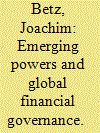

|
|
|
|
|
| Publication |
2014.
|
| Summary/Abstract |
The traditional mode of governance of national and global monetary and financial markets was obviously too weak and piecemeal to hinder the recurrent outbreak of regional and worldwide crises. The latest and gravest in this series triggered a massive institutional and operational overhaul, achieved both by the creation of new institutions and also by old and new ones being made stronger and more inclusive, foremost by introducing major emerging countries into their steering and oversight bodies. During this endeavour, national and institutional self-interests were initially subdued, but would come out forcefully later. As a consequence, the new edifices for multilateral market regulation and surveillance, as well as its financing, went only as far as the difficult compromise of an enlarged body of players would allow. Therefore, regional solutions or cooperation between like-minded countries were often seen as alternatives to a strong multilateral understanding, but are only able to complement the existing international monetary and financial system.
|
|
|
|
|
|
|
|
|
|
|
|
|
|
|
|
| 20 |
ID:
136053
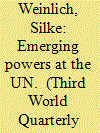

|
|
|
|
|
| Summary/Abstract |
The economic rise of China, India, South Africa, and Brazil has turned these countries into important providers of development assistance. While they seem increasingly comfortable in their bilateral relations with other developing countries, they are struggling to adapt their position within global institutions such as the United Nations. Do they turn their increased weight into a greater influence at the UN, and if not, why not? This article analyses financial contributions and political positioning at the UN in the area of development. Despite small changes, the four countries mostly insist on keeping their traditional status as recipients and ‘ordinary’ developing countries. This reservation can be explained in two ways: first, a more explicit leadership creates political and material costs that outweigh the potential benefits. Second, their shared experiences as developing countries make it hard to break ranks at the UN.
|
|
|
|
|
|
|
|
|
|
|
|
|
|
|
|
|
|
|
|
|